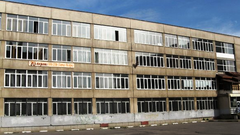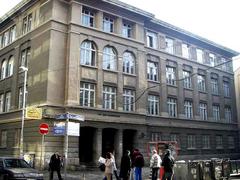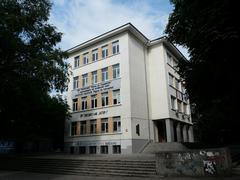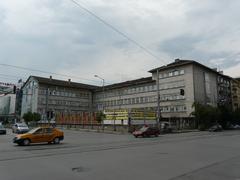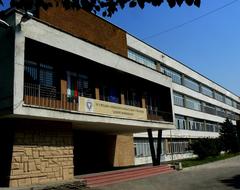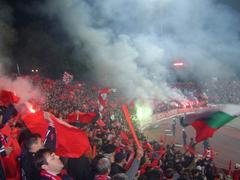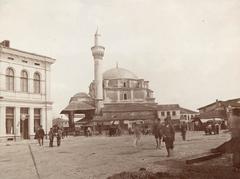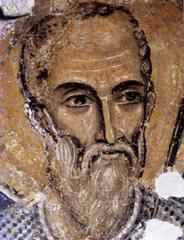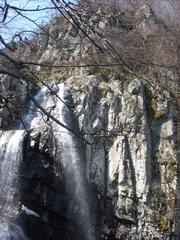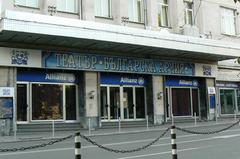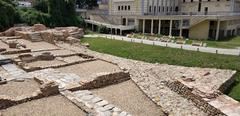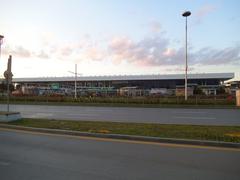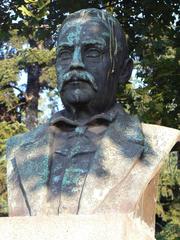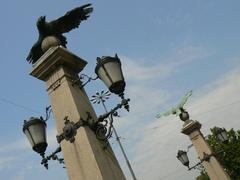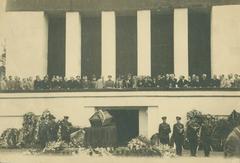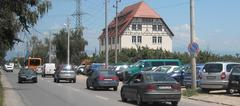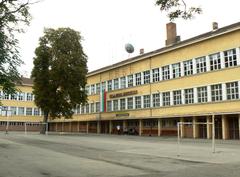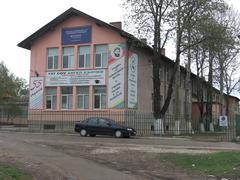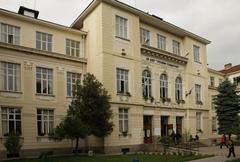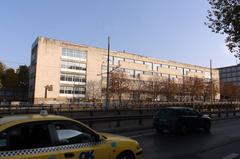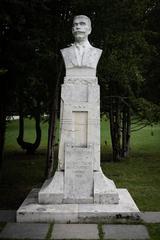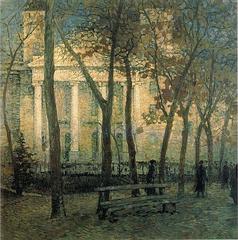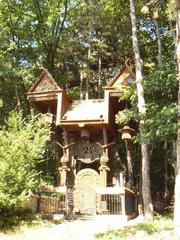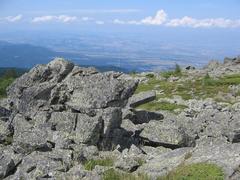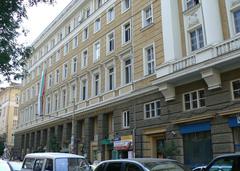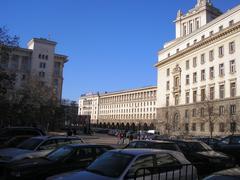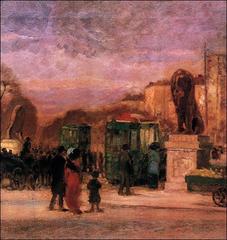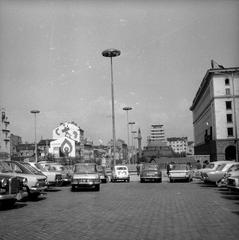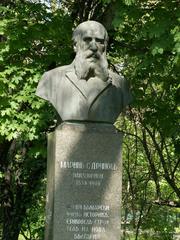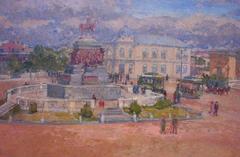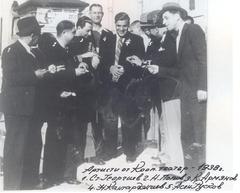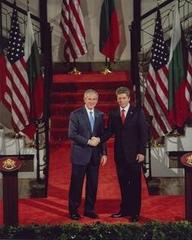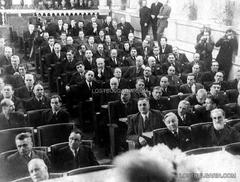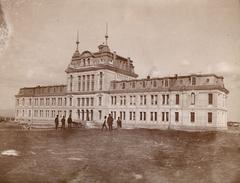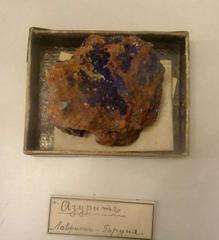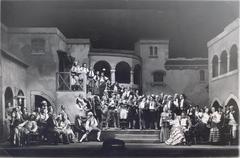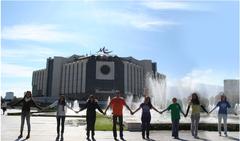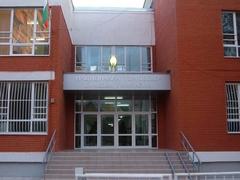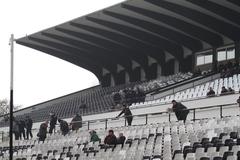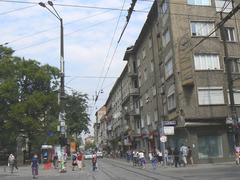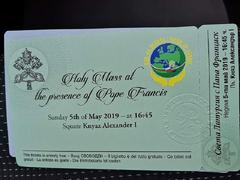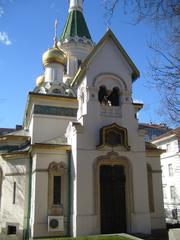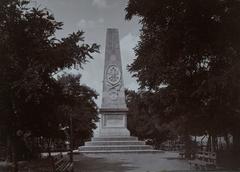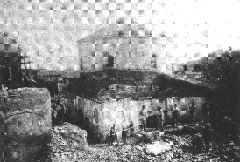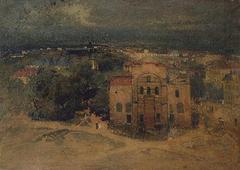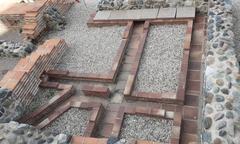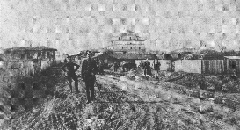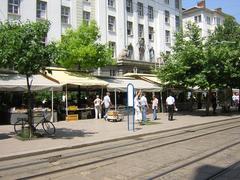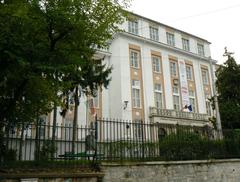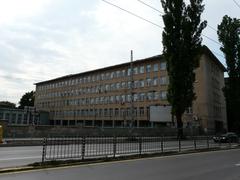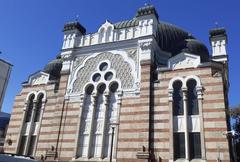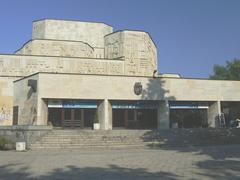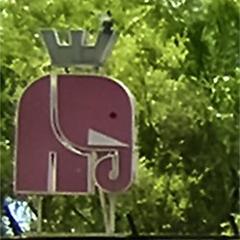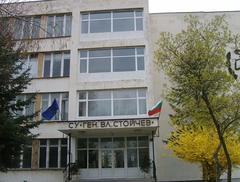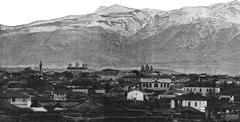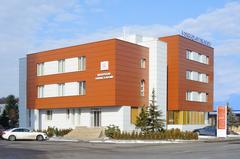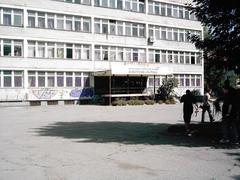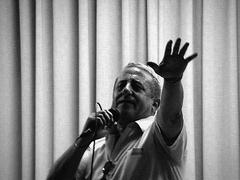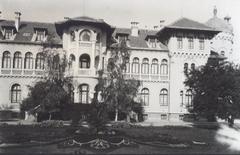High School 96 Lev N Tolstoy, Sofia, Bulgaria: Visiting Hours, Tickets, and Historical Significance
Date: 14/06/2025
Introduction
Nestled in Sofia’s Lyulin district, 96 Lev N Tolstoy High School stands as a distinguished Bulgarian institution that entwines the nation’s educational ambitions with the legacy of the Russian literary giant and educational reformer, Leo (Lev) Tolstoy. Established in 1982 during a period that celebrated Bulgarian-Russian cultural ties, the school was conceived to promote Russian language instruction, moral cultivation, and intellectual development. Today, it serves as both a center of learning and a vibrant cultural landmark that embodies Tolstoy’s visionary educational principles: child-centered learning, moral development, and cultural pluralism (96sou.com; leo-tolstoy.com).
This comprehensive guide offers practical details for prospective visitors—including visiting hours, accessibility, and travel tips—while also contextualizing the school’s historical and cultural significance. Whether you are a cultural enthusiast, educator, or student, this guide will help you make the most of your visit and appreciate the unique heritage of High School 96 Lev N Tolstoy.
Table of Contents
- Introduction
- Origins and Naming of 96 Lev N Tolstoy High School
- Leo Tolstoy: Educational Reformer and Philosopher
- Tolstoy’s Influence in Bulgaria
- The School as a Living Legacy
- Modern Educational Innovations
- Recent Achievements
- Strategic Partnerships and Collaborations
- Practical Visitor Information
- Frequently Asked Questions (FAQ)
- Additional Resources and Contacts
- Conclusion
Origins and Naming of 96 Lev N Tolstoy High School
Founded in 1982, the school initially prioritized Russian language education, reflecting Bulgaria’s strong cultural and academic ties with Russia during the late 20th century (96sou.com; bg.revieweuro.com). By 1983, it had relocated to its current Lyulin campus, which was among the first in Bulgaria to be equipped with radiant heating—symbolizing a commitment to innovation and modernity.
The choice to name the school after Lev Nikolaevich Tolstoy underscores its dedication not only to literary achievement but also to the reformist, ethical, and educational ideals Tolstoy championed. These principles remain central to the school’s mission, which is recognized for its academic excellence and progressive teaching methods (96sou.com).
Leo Tolstoy: Educational Reformer and Philosopher
Best known for literary masterpieces like “War and Peace” and “Anna Karenina,” Leo Tolstoy (1828–1910) also made profound contributions to educational theory. In the 1860s, he established a school for peasant children at Yasnaya Polyana, advocating for accessible, inclusive education that fostered critical thinking and moral growth (leo-tolstoy.com; encyclopedia.com).
Tolstoy’s educational philosophy emphasized:
- Child-centered learning: Adapting teaching methods to individual student needs (academia.edu).
- Moral and practical education: Integrating ethics and practical skills, moving beyond rote memorization.
- Cultural pluralism: Encouraging international perspectives by translating and teaching stories from diverse cultures.
His forward-thinking ideas influenced educational reformers worldwide, including John Dewey and A.S. Neill (en.wikipedia.org).
Tolstoy’s Influence in Bulgaria
Early Bulgarian Engagement
Tolstoy’s works were widely embraced by Bulgarian readers in the late 19th century, with early translations such as “My Confession” (1889) and “The Kreutzer Sonata” (1890) (sesdiva.eu). Bulgarian intellectuals debated his dual role as novelist and moral philosopher, further cementing his influence on the nation’s cultural and educational discourse.
The Tolstoyan Movement
Tolstoy’s teachings inspired a Bulgarian Tolstoyan movement from the 1890s, advocating for nonviolence, antimilitarism, vegetarianism, and spiritual independence. Figures like Sava Nichev propagated Tolstoyan ideals through translations and gatherings, shaping social and intellectual trends (sesdiva.eu).
Educational Impact
Tolstoy’s educational philosophy resonated with Bulgaria’s own reforms, influencing curriculum and institutional development. Naming the school after Tolstoy reflects both reverence and a commitment to progressive education (96sou.com; leo-tolstoy.com).
The School as a Living Legacy
Mission and Facilities
As an “innovative school” recognized by Bulgaria’s Ministry of Education, 96 Lev N Tolstoy High School is actively involved in national innovation programs (96sou.com). Facilities include:
- 30 classrooms and 10 specialized cabinets
- 5 computer labs with internet access
- Modern gymnasiums and outdoor sports fields
- Fitness center, assembly hall, cafeteria, and two buffets
- Library with over 12,000 volumes in Bulgarian, Russian, English, German, and Spanish
Graduates frequently continue their studies at top universities in Bulgaria and abroad.
Cultural and Educational Activities
The school fosters cultural exchange through competitions, festivals, and collaborative projects, celebrating both Bulgarian and Russian heritage. The curriculum promotes critical thinking, creativity, and social responsibility (96sou.com).
Symbolic Significance
The dedication to Tolstoy serves as a daily reminder of his educational and ethical vision, encouraging students to become conscientious, engaged citizens.
Modern Educational Innovations
Technology and Digital Classrooms
The school has invested in digital transformation, equipping classrooms with interactive whiteboards, digital projectors, and an online learning management system. This infrastructure supports blended and remote learning, ensuring continuity and accessibility. Teachers receive ongoing professional development in digital pedagogy.
Personalized and Competency-Based Learning
Individualized learning plans allow students to pursue areas aligned with their interests and strengths. Project-based learning and critical thinking are emphasized, while competency-based education focuses on mastery rather than rote memorization. Teachers use data-driven insights to tailor instruction.
Holistic Development
The school fosters emotional, ethical, and social growth alongside academics. Extracurricular programs in arts, sports, and community service, as well as counseling services, support student well-being and leadership.
Recent Achievements
Academic Excellence
The school consistently ranks among Sofia’s top public high schools, excelling in national exams and competitions in Bulgarian, mathematics, and foreign languages. Students regularly earn distinctions in Olympiads and contests.
Recognition and Extracurricular Accomplishments
Faculty are recognized for innovative teaching; the alumni network includes leaders in diverse fields. Extracurricular successes include drama performances, debate competitions, and sports achievements.
Community service initiatives, such as environmental clean-ups and charity drives, reinforce social responsibility.
Strategic Partnerships and Collaborations
Higher Education and Industry Links
The school partners with Sofia University and the Technical University of Sofia, offering advanced coursework, internships, and dual-enrollment programs.
International and Community Programs
Participation in Erasmus+ projects and collaborations with European schools promote language skills and intercultural competence. Community partnerships support sustainability and youth empowerment.
Practical Visitor Information
Visiting Hours and Access
- Open Days: Held twice a year (fall and spring), featuring guided tours and information sessions.
- Regular Visits: Available by appointment, Monday–Friday, 9:00 AM–4:00 PM. Contact the administration at least two weeks in advance (96sou.com).
Entry and Ticket Information
- Admission is free for visits, open days, and cultural events.
- Registration in advance is required; follow school safety protocols.
Location and Accessibility
Located at ul. “Nikola Belovezhdov” 1, Lyulin 4, Sofia, the school is easily accessible by metro and bus. The campus is wheelchair accessible, with ramps, elevators, and accessible restrooms.
Nearby Attractions
Explore Sofia’s history and culture by visiting the Sofia History Museum, National Theatre, or St. Alexander Nevsky Cathedral. The Lyulin district itself offers authentic local dining and parks.
Entry Requirements and Visitor Etiquette
- Present valid ID upon entry and sign in at the security desk.
- Dress modestly and respect the learning environment.
- Photography is permitted in designated areas with staff permission.
Safety and Security
The school follows standard security protocols. In case of emergency, dial 112. For up-to-date safety information, consult local resources or your embassy (Nomadic Matt’s Sofia Guide).
Tips for a Meaningful Visit
- Engage: Attend open days or events for a deeper experience. Interact with students and faculty when possible.
- Combine Visits: Pair your school tour with other Sofia attractions for a full cultural day.
- Communicate: While Bulgarian is the main language, staff and students often speak English or Russian.
- Plan Ahead: Contact the administration early, especially if special accommodations are needed.
Frequently Asked Questions (FAQ)
Q: Can I visit at any time?
A: Visits are by appointment or during open days/events. Contact the school in advance.
Q: Is there an entry fee?
A: No, visits and events are free, though donations may be accepted.
Q: Are facilities accessible for people with disabilities?
A: Yes, the school is equipped to accommodate visitors with mobility needs.
Q: Can I take photographs?
A: Yes, in designated areas and with staff permission.
Q: How do I get there by public transport?
A: The school is accessible via several bus lines and the Lyulin metro station.
Additional Resources and Contacts
- 96sou.com
- International Schools Database
- leo-tolstoy.com
- sesdiva.eu
- bg.revieweuro.com
- Free Sofia Tour
Conclusion
High School 96 Lev N Tolstoy in Sofia unites educational innovation, cultural heritage, and historical reverence. Its foundation honors Lev Tolstoy’s enduring influence as a thinker and reformer, and its commitment to modern teaching, personalized learning, and holistic development ensures its continued relevance. Visitors are welcomed to experience not just an educational institution, but a living tribute to Tolstoy’s legacy in Bulgaria. For up-to-date information on visiting hours, programs, and events, consult the school’s official website.
Explore more:
Stay connected:
Download the Audiala app for curated educational tours, and follow us on social media for updates on Tolstoy-related events and Sofia’s cultural offerings.
References
- Visiting 96 Lev N Tolstoy High School in Sofia: History, Legacy, and Visitor Information, 2025, 96sou.com
- High School 96 Lev N. Tolstoy Visiting Hours, Tickets & Sofia Historical Sites Guide, 2025, International Schools Database
- Leo Tolstoy: Educational Reformer and Philosopher, 2025, leo-tolstoy.com
- The Early Reception of Lev Tolstoy in Bulgaria, 2025, sesdiva.eu
- Visiting High School 96 Lev N. Tolstoy in Sofia: Innovations, Achievements & Visitor Information, 2025, bg.revieweuro.com
